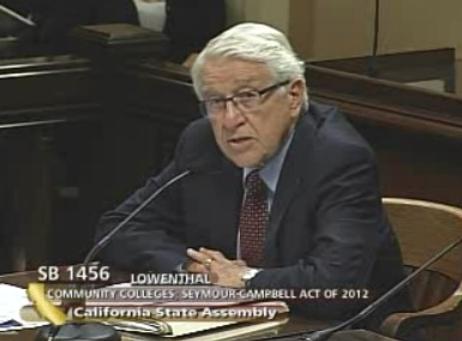Amid serious issues facing California community colleges today, possible reform is on the horizon. A new bill has passed California state legislators and is currently waiting on the desk of Governor Jerry Brown. The proposed legislation would bring some consistency to the California community college system and require schools in the state to focus on success and completion rates as much as they focus on enrollment and budgets. While the governor hasn’t dropped any clues on how he will go on this new law, those who drafted the legislation are hopeful that it could bring much-needed improvements to the California system if passed.
Student Success Task Force
Sen. Alan Lowenthal, D-Long Beach, drafted Bill 1456, or the Student Success Act of 2012. The senator used information compiled by the California Community College Student Success Task Force to create his new bill. According to iJournal, the 20-member task force included faculty, staff, students, and external stakeholders in the community college system.
The task force spent seven months examining how to improve success in community colleges while boosting achievement for underserved students. At the end of the year, the task force presented its findings to stakeholders to get additional input on the best ways to utilize this information effectively to improve the community college system in California. After the hearings, the Board of Governors adopted select recommendations to draft the final bill. These recommendations included:
Teach Basic Skills—Many community college students in California are first-generation students who have no point of reference when they enter an institution of higher education. These students require basic skills, and community colleges need to provide the right classes to teach them these skills.
Utilize Technology More Effectively—Technology can be better used to benefit both the colleges and the students. Students should be able to use technology to navigate the college system more adeptly. Colleges can use technology to streamline assessment procedures and monitor student progress.
Change Enrollment Policies—Currently, enrollment in courses is based on the number of units earned, leaving incoming freshmen at a decided disadvantage when it comes to getting the courses they need. New policies should help these students launch their community college careers effectively by allowing them to fill their requirements as quickly as possible.
Increase Transparency – While community colleges offer information about graduation and job placement rates, the information can be complex for the average person to understand. By creating a more straightforward method for delivering this information, prospective students and others will be better equipped to compare the success rates at community colleges across the state.
The Student Success Act of 2012 is Created
From the information received through the Student Success Task Force, Lowenthal drafted the Student Success Act of 2012. According to EdSource, this proposed bill would accomplish the following:
Streamline Placement Procedures
Develop a uniform placement examination that all community colleges in California would use. Currently, every school offers its placement exam, which results in inconsistent results and student placement. Some students will take tests at more than one community college to see where their placement is the best. In addition to consistency, this streamlined approach could save community colleges money since bulk buying of examinations from a single company could provide discounted pricing.
Establish Requirements for Fee Waivers
Currently, community college students in California can qualify for fee waivers based on income level alone. However, a recent increase in fee waivers has left schools across the state financially strapped. Students with waivers might also drop a class after the first few weeks of the semester, leaving another student waiting for that class without a slot. Bill 1456 would require students qualifying for fee waivers to maintain a passing grade to keep their funding.
Increase Transparency
The new bill would also require community colleges to post essential information like completion rates on an easy-to-understand scorecard that would allow prospective students, parents, and others to compare community colleges throughout the state. The scorecard would require schools to post completion rates and break those rates down according to ethnicity, gender, race, and income level.
In addition, the San Gabriel Valley Tribune reports that the bill includes requirements for colleges to provide orientation and an academic plan to every student before the first class is ever taken. This process is designed to help first-generation college students adapt to the college campus's different environments, expectations, and even vocabulary. Some California schools offer an orientation program, but say not all students participate.
Bill 1456 has passed the state legislature in a largely bipartisan vote and is now sitting on the desk of Governor Jerry Brown, awaiting final approval. Senator Lowenthal believes the bill is essential for the future success of California schools.
“While many students are getting out of the starting blocks at our community colleges, many fail to get across the finish line,” Lowenthal stated in a recent press release. “Fifty-four percent of all community college students fail to earn a certificate, associate degree or transfer within six years of attending community college. This situation is unacceptable by any measure and demands immediate change. SB 1456 is an important first step in realigning our community college system to the goals of student success and achievement.”
Questions@Contact us on Facebook. @communitycollegereview













